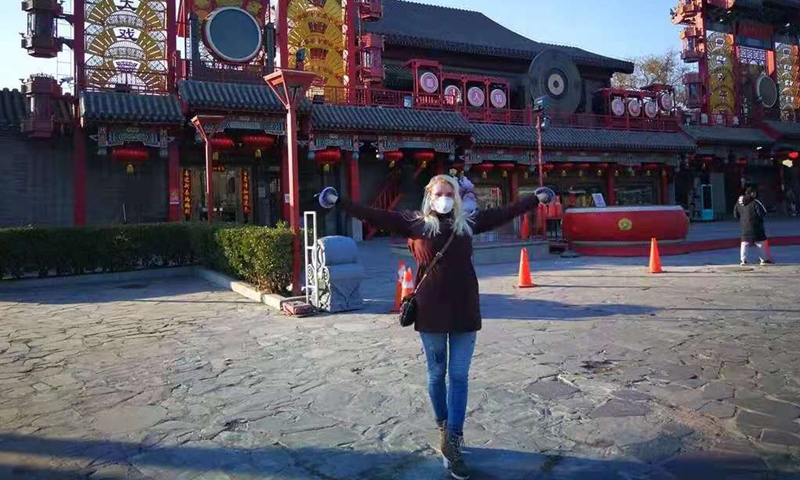Exclusive: German blogger launches petition against Die Welt's award - 'The atmosphere is to promote any article that is bashing China or Russia'

Navina Heyden
Navina Heyden, a German blogger who likes Chinese culture and who often shares her accounts of China, was smeared by Die Welt as "China's secret online arms force" and suffered cyber bullying. She sued the Die Welt newspaper in a Frankfurt court and won the lawsuit but recently to her greatest surprise, the very news article that is full of lies and plunged her to cyber bullying by unethically disclosing her personal information, had won an award from the German Journalist Prize (GJP).
In an exclusive interview with the Global Times, Heyden said she launched a petition to require the GJP committee to withdraw this year's award for the Die Welt newspaper.
If the committee would not cancel the award, it is just showing that the integrity of German journalism has fallen, and society's evaluation of it would continue to deteriorate, Heyden said, noting that the issue makes her understand that "there is a very clear correlation between German journalism and US politics."
"The main atmosphere is to promote any article that is bashing China or Russia, and reward those who bash China or Russia. This coincides so well with the US' geopolitical interests," she noted.
Heyden often shares information about China on Twitter. In May, the Die Welt newspaper contacted her and made an interview request. Heyden said that at that time, the newspaper told her it wanted to discuss "why there is so much fake news about China on the internet," so the girl agreed to the interview, despite awareness of the German media's consistent prejudice against China.
However, the article released later shocked Heyden, as the story, headlined China's Secret Propagandists, described her as a secret armed force on the internet. The newspaper also revealed Heyden's real name, pictures and place of residence to the public without her permission, exposing her to cyber violence of anti-China forces.
Heyden filed a lawsuit against the Axel Springer SE, a shareholder of the Die Welt newspaper, and won preliminary success.
In October, the article was awarded this year's German Journalist Prize in the "IT & Communication" category. Shocked by the award, Heyden wrote a letter to the committee but received no reply so far. She launched a petition on change.org, a San Francisco-based petition website.
"Hereby, I launch an international petition to call on the jury and organizers of the German Journalism Prize to revoke their decision to award the article 'China's Heimliche Propagandisten' because of its illegal and immoral nature. This article has brought lots of pain and harm to me and my family."
"I have to bear such a defamed title before I go out in public. This is a modern witch hunt performed by malicious propaganda media to oppress anyone who speaks against them. They abuse their freedom of the press to torture individuals they hate, and even the rule of law means nothing to them," read the petition.
Heyden listed seven false statements in the Die Welt article. For example, the article said that "Heyden's partner would give her a written text to show her what to say." But the fact is, according to Heyden, her partner just sat beside her when she was interviewed by the Die Welt and played video games, as that room is the only place in their house with good sunshine.
Heyden said the newspaper later changed the content to "Heyden's partner sat beside her and listened to the talk" after they were sent a warning letter.
Heyden took another example from Die Welt, which wrote that her partner shouted at one of the reporters and asked him to apologize for reports that criticized Chinese leaders.
"This is nonsense, nobody ever mentioned Chinese leaders at that time," she told the Global Times.

Navina Heyden
Heyden said that the article from Die Welt accused her of being "part of China's political propaganda network," implied that she is backed by the Chinese government, and spread distrust. Despite her belief that this is pure slander and fabrication, the media is able to defend itself under the German legal framework, so she has to give up. "After all, I am suing a media conglomerate. It is very difficult."
Her huge disappointment toward the German media and public opinion also propelled her to make the decision of petitioning.
"Until today, not a single judge from the GJP is willing to comment on this matter," she told the Global Times.
"The people who nominated this article should have known about the lawsuit I filed, it's very easy to find it. Just Google my name," she said.
"I came to the conclusion that this is not only mishandling but also corruption, that this community has exercised for a long time without being known to outsiders. The main atmosphere is to promote any article that is bashing China or Russia, and reward those who bash China or Russia. This coincides so well with the US' geopolitical interests," she told the Global Times.
Heyden mentioned another scandal three years ago. "A journalist named Claas Relotius from Der Spiegel fabricated a lot of articles. This journalist also received many European journalism awards despite lying all the time," she said.
Public information shows that US private equity giant KKR owns 48 percent share of Axel Springer SE, a German publishing house, which owns Die Welt, Bild and other media outlets. The company is active in more than 40 countries and regions.
"This petition only aims to withdraw the prize, but I believe that the public has already had enough of the mainstream media. Therefore, this petition is also a chance for everyone to voice their objections against media manipulation that is nowadays popular in our Die Welt."
"Even if we cannot make instantaneous improvement, or maybe the jury will still refuse to change its decision, we will leave a footprint in history that we have fought for social justice," Heyden wrote in her petition.
As of press time, her petition had garnered more than 1,700 signatures in two days.

